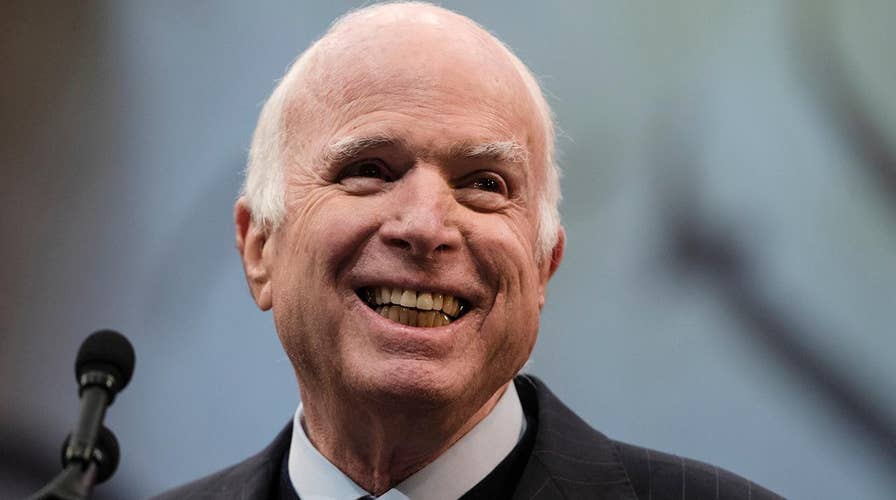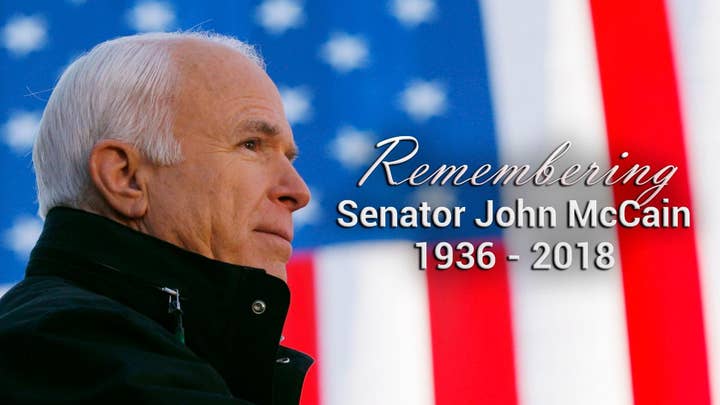John McCain to lie in state at Arizona Capitol
Constituents pay respects to late Senator McCain at public viewing at Arizona Capitol. Alicia Acuna has the story.
Sen. John McCain had an impact not just on our nation and the world through his work, but on the lives of many people fortunate enough to have known him personally. I was a high school student in ninth grade when I was fortunate enough to get the opportunity to work as an intern in his Senate office in Washington.
The opportunity arose by chance, when my father was visiting McCain’s office and was greeted by an aide to the senator, a lovely woman by the name of Patricia. My father – a native Arizonan – asked if I could do some volunteer work in the office, and the aide agreed.
I had no part in this and would have rather have been catching fly balls on the baseball field. My interest in politics was on the same level as my interest in math: nonexistent.
My only goal in life, at the time, was to become a professional baseball player like my hero, Cal Ripken Jr. But the chance to intern for a senator sounded interesting – and my father basically made me do it.
Over the next two years, I walked the four blocks from my high school in Washington to the Russell Senate Office Building several days a week after school. I would spend several hours sorting a large amount of mail each week in McCain’s office.
I helped read the mountain of incoming letters and divided them into piles based on the topic, for staff members to answer. Despite the monotony of the repetitive work, it turned out to be a phenomenal learning experience.
Thousands of letters came not just from McCain’s Arizona constituents, but from people all over the country and globe. People wrote about many topics, but one common theme was to commend the senator for his courage, his heroism, his principles, his independence and his drive to seek the truth.
Many of the writers expressed an enthusiastic admiration for the way McCain lived out his call for “a cause larger than yourself.”
I was a bit awed by the larger-than-life senator. I was shocked when he told me to call him “John” – not “senator” or “sir.” He told this to everyone in his office. But as an intern, I concluded that this giant of a man was not pretentious, not full of himself. He didn’t want to be surrounded by hero worshippers.
Coming from an Arizona family, my sense of pride made my chest swell whenever I walked into the Senate office that was covered in Native American art and southwestern photography – my Gonzaga High School purple and white duffel bag, filled with books and gym clothes, draped over my shoulder and a baseball cap on my head.
A few months into my freshman high school year, John McCain became my new inspiration, bumping Cal Ripken to the bench. I read all the books I could find about the senator, like Robert Timberg’s “The Nightingale’s Song,” and later McCain’s own book, “Faith of My Fathers.”
I would highlight the parts of the books that enthralled me – like McCain’s unbelievable bravery in a North Vietnamese prisoner of war camp – and would read them again.
My interest in politics sparked from a small, smokeless ember to a burning flame as a result of working in the senator’s office. The experience even lead me to eventually major in political science in college and write for the school newspaper.
I decided to pursue a career in journalism, in part because being a journalist gave me a McCainian cause greater than myself: the pursuit of the truth.
Years later the trajectories of our lives intertwined again. During McCain’s 2008 presidential bid I spent the end of the presidential cycle as part of the Fox News team covering the McCain campaign.
I would travel across the country as McCain spoke at rallies in states including Minnesota, Virginia and Florida. I even covered his concession speech in the Arizona desert on the night he lost the presidential race to then Sen. Barack Obama.
As a 14-year-old volunteering in the senator’s office, I could never have imagined that years later I would be reporting on him as a journalist as he came close to becoming president of the United States.
I was vacationing in Israel when I woke up to sadly discover that John McCain had died a few hours earlier. The Arizona senator’s death was major news in the Jewish state, where he was popular for his strong support of Israel.
Former Israeli Ambassador to the U.S. Michael Oren wrote in an op-ed in the Jerusalem Post: “John preserved the bipartisan support so vital to Israel’s security. It would be difficult to overstate the debt Israelis owe to John and our profound gratitude.”
I’m now back in Washington, covering the White House reaction to Sen. McCain’s passing.
Many Democrats and Republicans in this politically divided city have united in expressing their admiration for McCain’s heroism in war, in the halls of the Senate, and on the campaign trail. Journalists have also expressed their admiration for his defense of journalism and the importance of seeking truth as a society.
“Journalists play a major role in the promotion and protection of democracy and our unalienable rights and they must be able to do their jobs freely,” McCain wrote in January in an op-ed in the Washington Post. “Only truth and transparency can guarantee freedom.”
If I could talk to him one last time I would say:
Thank you, John, for giving a 14-year-old kid a life-changing opportunity. By your example of living a principled life filled with a cause greater than yourself – your love for your country – you inspired me to be the journalist, the man, I am today. May you rest in peace, and with assurance that your life influenced many others – and that your legacy and impact on America and the world will be indelible.










































